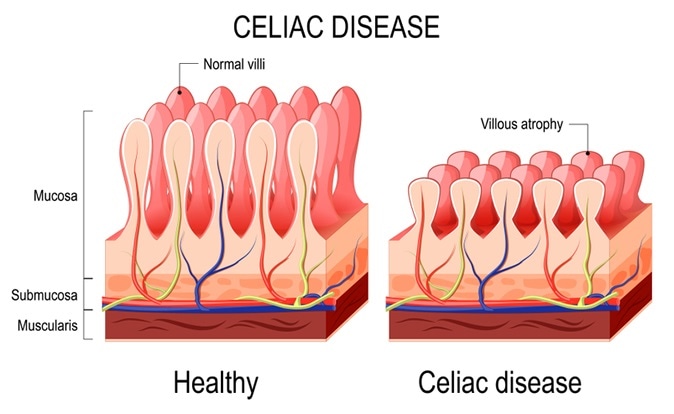US-based pharmaceutical company ImmusanT, after worldwide trials, is all set to start clinical trials of a new vaccine against coeliac disease at the Royal Melbourne Hospital Clinical Trials Centre in Melbourne. This will be followed by trials to be held at Adelaide, Brisbane, Perth, Mackay and Sunshine Coast say the sources.

Coeliac disease - normal villi and villous atrophy. Image Credit: Designua / Shutterstock
The injectable vaccine was developed some eight years previously in Melbourne and has been shown to be safe in the initial trials with small number of participants. The disease is basically an exaggerated immune response of the gut to food based allergens such as gluten. Among patients of coeliac disease these allergens in food lead to severe allergic reactions leading to gastrointestinal upset. There are at present around 160,000 Australians living with coeliac disease and are forced to live on diets that are entirely devoid of gluten to prevent the debilitating symptoms. This means that around 1 in 70 Australians are now living with coeliac disease say the researchers who developed the vaccine. Gluten is a protein component found in certain grains such as rye, wheat and barley.
This new vaccine called the Nexvax2 can reprogram the immune reaction to gluten. This prevents and alleviates the symptoms. It was developed at the Walter and Eliza Hall Institute of Medical Research (WEHI). The team there found three peptides in the gluten which usually triggers the symptoms in 90 percent of the cases and created the vaccine against these peptides.
For this latest phase 2 clinical trial, around 50 patients from across Australia, New Zealand and the United States would be recruited. They would be given injections of the trial vaccine or placebo twice per week for four weeks. The patients would not know which of the two (vaccine or placebo) they have received. Thereafter the participants of the trial would be faced with three food challenges to see if they receive symptomatic relief. Protective effects of the gut wall lining would be tested by taking a biopsy of the internal walls of the intestine.
The team explains that the vaccine can prevent the excessive sensitivity of the immune cells of the gut in susceptible individuals. These T cells thus do not go into “attack mode” when faced with gluten. According to the developers of the vaccine, it can be beneficial for up to 90 percent of patients who have the HLA-DQ2 genetic form of the disease.
Vaccine developers led by Dr Jason Tye-Din, from WEHI and Royal Melbourne Hospital explain that there have been national and international Phase 1 trials where they looked at the highest possible dose of the vaccine and have still found it to be safe and well tolerated. Dr Tys-Din said, “It also showed an intended biological effect on the immune system in patients with coeliac disease. The Phase 2 trials build on the data from earlier studies and it is great that Australia is still playing a pivotal role in this work.”
“A successful therapy that can restore normal gluten tolerance would revolutionise coeliac disease management,” he said.
A list of hospitals where the trial would be conducted can be found at www.coeliac.org.au